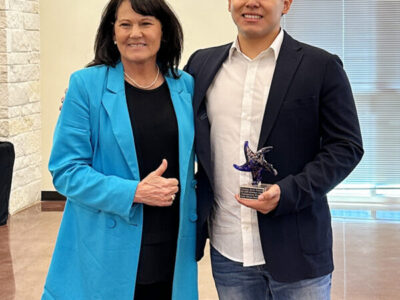How family and stress play a role in the undocumented student experience in college
Navigating higher education can be challenging for anyone – but for undocumented students the environment is even more unpredictable and isolating.
Recent research by higher education scholar Dr. Cinthya Salazar in the Department of Educational Administration and Human Resource Development at Texas A&M University sheds light on the challenges undocumented students face in higher education. The challenges are all too familiar for Salazar.
“When I was in Florida, navigating first community college, and then my four-year institution, I never really talked to anyone about my status. I never really trusted institutional agents, or even faculty to know my experiences or even care about my experiences,” Salazar says. “There was this very general approach to education that didn’t pay attention to the minoritized groups, or at least that’s how I felt as an undocumented student.”
Now as a U.S. citizen, Salazar strongly advocates for shifting the tide on how higher education institutions address the growing needs of undocumented students. She says it all starts with being educated and informed.
“I believe highlighting the human and college experience of undocumented students allows our institutions and administration in higher education to have more information to inform our policies and practices,” Salazar says.
A weight on their shoulders
Many undocumented students across the U.S. experience the same pressures their fellow classmates do, such as assignments, deadlines and preparing for exams. This normal stress only is intensified by their undocumented status. Salazar’s research found that these students rely on their families and the support systems schools create to shoulder some of the pressure they face.
“[Undocumented] students kept talking about when they were encountering any challenges, they would first reach out to their families unlike going to maybe administrators or an advisor,” Salazar says. “They rely a lot on their parents, siblings and extended families as well to find resources or motivation when they were doubting if they could continue moving forward.”
Additionally, many undocumented students lack the same financial resources that citizen students are granted through financial aid grants and scholarships, as many require a proof of citizenship or residency. This creates financial stress for undocumented students and their families.
“Half of the sample population said their families were paying for their education out-of-pocket and I was not expecting to find that data,” Salazar says. “Most of the parents of the [undocumented] students were also undocumented, and they were still paying for their education out of pocket.”
Salazar says the students appreciated their family’s sacrifice, knowing that it was hard for their parents to pay for their education. Therefore, undocumented students feel a responsibility to take it seriously and succeed.
Family units can also add stressors for students. Salazar said she observed women faced with the ultimatum of choosing between continuing their education or supporting their family unit. If they chose their education, they were shunned or cast out by their families.
A participant in the study, Paola, shared that she won a scholarship to go to college and live on campus the first semester, but her mother did not want her to live on campus.
“She decided to take the scholarship and it caused a very distant relationship with her mother – her mother stopped talking to her and she lost that support from her family,” Salazar says. “Her mother told her multiple times that she needed to help support her when she returned to their home country of Bolivia.”
Salazar says Paola came from a single-parent household. With no siblings to turn to, the stress of losing the connection with her mother added to other stressors, such as being alone on a college campus without familiar faces and the burden of knowing she would eventually have to bear the weight of supporting her family in the future.
Reshaping the narrative of being undocumented
Friends are an important part of the college-going experience. Undocumented students struggle with authentic friendships because they fear they cannot be completely honest or trust their peers in disclosing their undocumented status. Salazar recalls how difficult it was for herself to reveal that she was undocumented to her fellow peers. Many of other students also live with this concern due to fear of prejudice or judgment.
She says the way for schools to support their undocumented populations is by helping educate and change the narrative on being undocumented. Currently, admissions policies vary by state, but most schools do not require proof of citizenship in their applications, according to the College Board.
“Institutional agents are ignorant of the policies and sometimes hostile,” Salazar says. “Participants in my study, similar to students I work with in higher education, have to do all the work. They have to educate administrators, educate faculty on the policies and that is a huge burden. It’s a lot of information you need to know.”
She says undocumented student have been the exception and not the rule. Salazar adds that there are often contradictions between state policies and institutional practices that allow some students to succeed while placing barriers for others.
Becoming “undocu-serving” institutions
It is estimated over 450,000 students in U.S. higher education are undocumented. Salazar’s goal hopes to start a larger dialogue with her research among higher education institutions and what they can do to become what she calls “undocu-serving institutions.”
“What my student co-researchers and I found in the research is that undocu-friendly is not enough,” Salazar says. “Undocu-serving is a term that we introduced that is a level that institutions should aim to reach.”
Undocu-serving institutions is not an official term, but it has been used in research to identify schools that have programs or centers in place to assist undocumented students as they make their way through school. In Texas, only three college campuses are considered undocu-serving campuses. Salazar says more research into understanding what they can do to create a safe, inclusive environment for undocumented students is needed.
“We need to meet their needs and serve them,” Salazar says. “The goal is to continue to understand what makes an undocu-serving institution. We are advocating for institutions to go that step further and have more resources available.”
She says certain resources that could be improved are mental health and counseling services to be better trained in understanding the struggle of an undocumented student, as well as equitable access to scholarships and grants.
She says when institutions create a more inclusive environment, they are able to retain a larger, diverse population that can truly persist through and become successful professionals.
About the Writer
Justin is a native of Harlingen, the capital city of the Rio Grande Valley in Deep South Texas. He graduated in 2021 from The University of Texas Rio Grande Valley with a Bachelor of Liberal Arts, majoring in Mass Communication with a concentration in Print Journalism. Justin is responsible for writing news and feature stories for the College and its various departments to be featured via the web, social media, and various other media outlets.
Articles by JustinFor media inquiries, contact Justin Elizalde.














